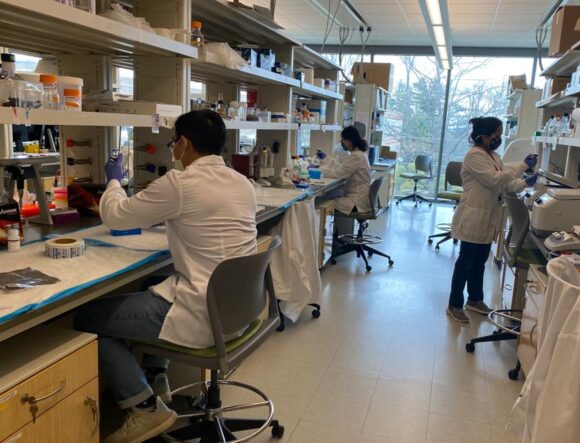
Students in the Sampath Lab are working on understanding the molecular mechanisms underlying metabolic diseases like fatty liver and type II diabetes. Research for 2020 requires following COVID-19 safety guidelines. Photo courtesy of Dr. Harini Sampath.
The New Jersey Institute for Food, Nutrition, and Health (IFNH) hosted its second annual IFNH Research Day on November 4th. This effort, when all the units come together to present jointly, underscores the interdisciplinary approach of IFNH where the units work together to seek solutions to health problems in the social as well as the biological determinants of health.
While the basic structure of the meeting was the same as last year’s inaugural Research Day, the 2020 event was different on many fronts. Not only did COVID-19 disrupt the access to campus facilities, but also the way research, programs and communications were conducted.
Despite these challenges, the breadth of IFNH research has continued to expand, and this was reflected in this year’s presentations, as well as in the structure of IFNH, with the incorporation of a new Center, the Center for Agricultural Food Ecosystems (RUCAFE). The Institute is home to five centers and three programs–all promoting or conducting cutting edge initiatives in the fields of nutrition, food and health.
This year the event was held virtually with 157 attendees, including faculty, staff and students, representing various disciplines from diverse Rutgers departments, Rutgers Biomedical and Health Sciences and some outside agencies.
The Research Day line-up started with annual reports from the IFNH leadership, including the directors of the Institute, Centers, Programs and Cores. The sessions featured five to six speakers from each of the Centers discussing their research projects, spanning from lipids and metabolism, food, nutrition, children’s health, and the microbiome. The program concluded with a virtual poster session.
IFNH director Maria Gloria Dominguez-Bello recognized the Center, Program and Core directors as well as the presenters and students for the successful execution of the program and the representation of their work and its role in the Institute’s mission.
Dominguez-Bello commented, “Rutgers has so much potential in its diversity of disciplines and its scientific quality, and IFNH wants to be the hub where they converge to address the enormous nutritional challenges we have today. They span scales, from environment and sustainability, to our microbiome, early development, lifestyle/exercise, and cellular metabolism.”
As the ongoing research continued and modified due to the COVID-19 restraints, new challenges on target audiences will emerge from the effects of COVID-19.
RUCAFE director and distinguished professor of plant biology Jim Simon, commented, “The IFNH’s new Rutgers University Center for Agricultural Food Ecosystems is an innovative and creative space where science, technology, culture and art come together to develop sustainable solutions to complex food system challenges. Before the pandemic food security was a serious national and international issue and now with COVID-19, it has only become more noticeable and critical to address.”
Dominguez-Bello added, “The IFNH Annual Research Day increases the Institute’s visibility, transparency and catalyzes new multidisciplinary collaborations needed to respond to the nutritional challenges posed by the current social and environmental issues that affect the state, the nation and the world.”
The IFNH Centers include the Rutgers Center for Lipid Research; Center for Nutrition, Microbiome, and Health; Center for Childhood Nutrition Research; Center for Human Nutrition, Exercise and Metabolism; and Center for Agricultural Food Ecosystems; along with programs in Culinary Health, One Nutrition, and the NJ Healthy Kids Initiative.

